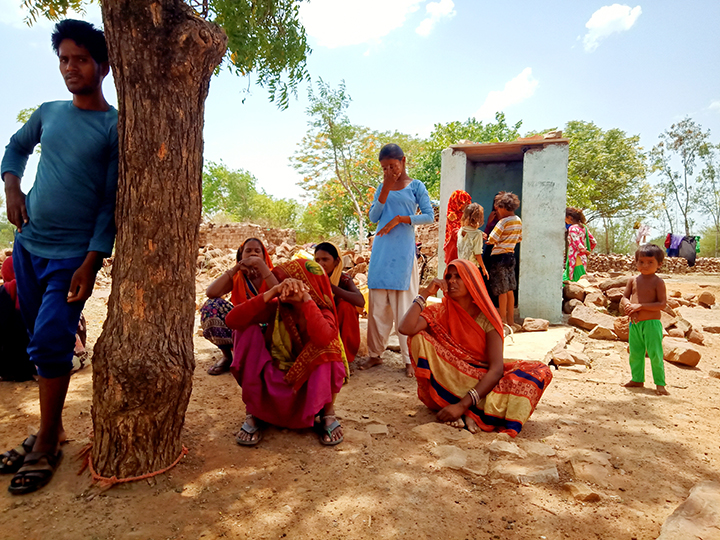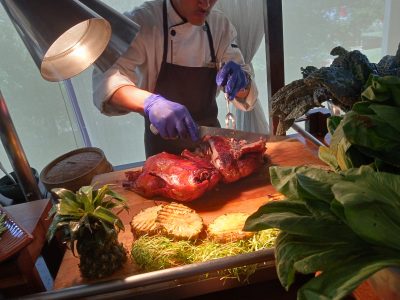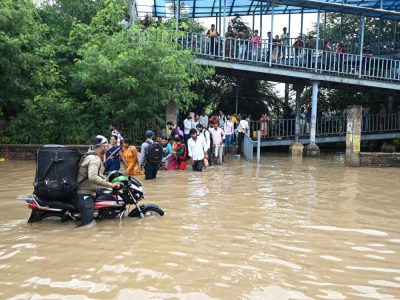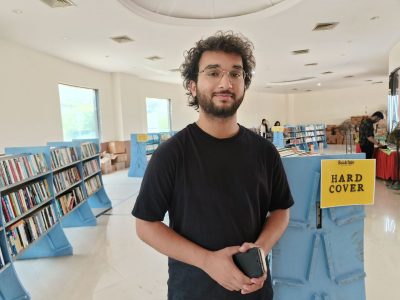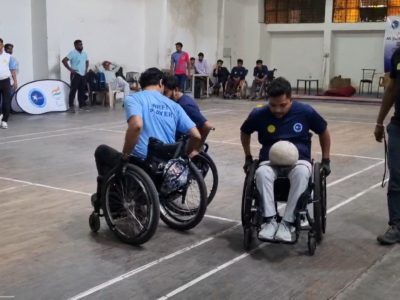The only sign of a welfare state in villages occupied by Sahariya tribals is grains provided to ration cardholders. Without MGNREGA schemes or access to wage work, seasonal migration is their only hope
This summer is an unusual one for Puran, a Sahariya Adivasi from Kunwarpur village in Shivpuri, MP. Every year during this time, he would go in the jungle and collect tendu leaves. An assigned contractor would collect these leaves and use them to make beedis (rolled cigarettes).
For this work, Puran used to get up to Rs 2,000-4,000 per season which lasts 15-20 days. “The prices we get differ from season to season; at times we get Rs 250 for a bundle of 100 leaves, sometimes as little as Rs 80 for the same.” Puran says.
This system, called Fad, is an important source of seasonal employment for Sahariyas. However, during the lockdown, Adivasis of Puran’s village couldn’t get work. While in some other villages, contractors did organise Fad and collect tendu leaves, most Adivasis couldn’t travel to these centres to sell the minor forest produce.
Even in this scorching heat, Puran likes to smoke beedis, the cheapest kind of intoxication that he can get. Almost every male above 14-15 years of age smokes in his community in Kunwarpur village. Sahrana (the name given to localities where Sahariya tribals live) of Kunwarpur village, where around 12 homes of Sahariyas are located, is one km from the main village. Sahariyas are also spread across many nearby villages like Munderi, Khajuri and so on. In Shivpuri district, the Sahariya population is 11.27%.
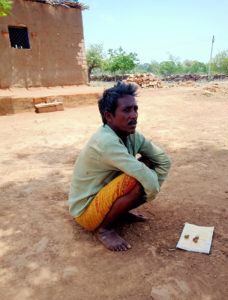
Few years ago, when a reserved seat for adivasi was announced, Puran contested for the village head position. He sold his 4 bigha land (less than one acre) for a consideration of a mere Rs 40,000. And unfortunately, he lost both land and election, rendering him a landless labourer.
Every year, between February and March, Puran and his family go to Agra to work on farms harvesting potatoes. A contractor whom they know very well would hire them, providing yet another seasonal form of employment. Puran says he will again go for the work as this is their important source of income. This year too, he went there along with his family but returned just before lockdown was announced, his contractor having warned him about the graveness of the situation. Since the lockdown started on 24 March, many labourers like him are returning home. Puran was lucky to reach home safely before the situation turned grimmer.
In this kind of seasonal migration, workers migrate along with their children, especially when they are young. It is a common practice among Scheduled Castes and Tribes of central and southern parts of India. They are paid as a family unit by the contractor, usually known to them.
Back in Kunwarpur, very few tribal children are enrolled in school — in fact, only one boy has studied till Class 8. Not even 2% of Sahariyas studied till high school.
When the topic of education is broached, Puran gets irritated. He says kids of his community in Kunwarpur do not want to study. A 2014 study ‘Young migrants at worksite’, covering 361 informal worksites in seven cities Bhopal, Chennai, Delhi, Guwahati, Jaipur and Patna, tell us that 39% did not receive any kind of education. The study also reveals that a largemajority never received integrated child development facilities – most important among which is maternal health care. To make things worse, child marriage is still prevalent among them. One of the important worries for Puran, when we spoke to him, was that he couldn’t marry off his daughter — though she is not yet 18 — due to the lockdown.
Grimmer situation
On 26 March, the Modi government said it would send double the amount of ration. In Khajuri, Kunwarpur, Munderi villages that the Patriot visited, most of the Sahariyas got rations, except those whose ration cards had some anomaly. For instance, Ram Singh of Kunwarpur village had a ration card issued on his mother’s name, and he couldn’t get ration as a receipt had been issued on his name instead of his mother’s.
The amount of ration is sufficient but the problem is that wheat and rice are only part of a balanced diet. No pulses are provided. Malnutrition and tuberculosis are rampant in this community. In such a scenario, nutrition security is very important. Jean Dreze, a leading economist, in his recent article in the Hindu says that PDS leaves out 500 million people and it serves merely as little more a protection against hunger. Nutrition insecurity can have negative health impacts.
Sahariyas do not follow basic hygienic practices like daily baths; despite having toilets, they prefer defecating in the open. They don’t wash hands much. Some of the villages in Shivpuri district suffer from water scarcity. During a pandemic that requires high hygiene, such water scarcity can have a serious impact.
Under the Pradhan Mantri Awaas Yojna launched in 2016, many families in Shivpuri district received Rs 1.38 lakh for pucca (cemented) house and an additional Rs 12,000 for toilets. But many have spent the money on other expenses without building a house. They are still living in huts made of cowdung and soil.
Sahariyas are particularly vulnerable to Climate Change and national disasters due to low development. This primitive and socially backward tribal community used to be forest dwellers. They have been evicted from their natural habitat, forcing them to settle in villages and work as agricultural labour.
Legends of Sahariya say once Lord Shiva blessed them to have access to the jungle like lions. Unfortunately this community is suffering due to inability to get their forest rights.
Anthropological literature says Sahariya are a Kolarian, Munda-speaking tribe and in 1981 were identified as ‘aboriginal’. As of 2020, one can say that the tribe has almost forgotten its history and has adopted the Hindu way of life.
Out of welfare reach
Although the Centre gave explicit instructions to reopen its flagship rural jobs scheme, MGNREGA from 20 April, not a single person has got employment under this scheme in Kunwarpur. Rambati says, “We don’t have any of our usual work, nor has anybody asked us to come and join work. In many villages, fad is still in operation. But for us, there is nothing there.”
As per government data, in April only 30 lakh people were provided work under the Mahatma Gandhi National Rural Employment Guarantee Act (MGNREGA), about 17% of the usual.
At such times, only the non-profit sector can be relied up to provide succour to such marginalised communities. Activists of the Mazdoor Kisan Shakti Sangathan filed a petition in the Supreme Court on 4 April demanding that full wages should be paid to 7.6 crore active card holders. On 20 April, an intervention application was filed that demanded unemployment allowance be paid to all who were at work on 24 March.
The MGNREGA scheme says that if workers register for work, they are eligible for an unemployment allowance amounting to a quarter of their wages in the first month, half in the second and full wages thereafter.
Even when work starts under MGNREGA, the government needs to ensure that leakage of funds stops. A senior panchayat officer on anonymity said, “Sarpanchs often use machines to get work done without hiring labour, because most of the labourers anyway find work. Sometimes, the Sarpanch and panchayat secretary divert money into their own accounts, though it comes in the name of these labourers. Since money comes directly in the account these days, it is siphoned off in different ways, depending upon the unique social set up of a village. For instance, they add someone in the list who is not working and share the money with that person later.”
Jean Dreze also says that except those areas where workers are empowered, workers do not initiate work (reflected in e-muster rolls). Work is always initiated by other stakeholders like landowner, government official or village head.
In some villages, Sahariyas work as bataidar (sharecroppers) – landless workers work in others’ fields and are paid in grains, not money. For example, on one bigha land they can be paid 100-200 kg of grain. But due to lockdown, that work is also suffering because they are not allowed to travel. Now when restrictions are lifted, some of these agricultural labourers are returning to work.
However, Sahariyas who do not work in others’ fields are left with no option. In Kunwarpur, they are spending their time playing cards and chatting without doing anything constructive.
The drinking habit is already a problem, and with so much enforced idleness due to the Covid-19 lockdown, this situation can turn grimmer. Sahariyas most drink handmade or local alcohol, thus death due to low quality alcohol and violence can be a major worry.
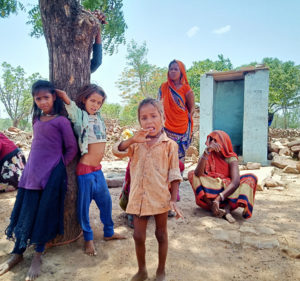
Return of workers
Sudden lockdown has created a humanitarian crisis. A lot of labour is going back home, which is causing huge demand for food in the source state. Even for the poor who did not migrate, lockdown marginalised them. They are living without work on less food.
Renowned economist professor Ravi Srivastava says that all this suffering is the result of policy failure. Talking to Patriot, he said that the government should at least increase days of work in MGNREGA from 100 to 150-200 days. “A lot of economists including myself are saying, some kind of direct cash transfer is required. Poor people need cash in hand immediately.”
Experts are saying at least Rs 7,000 cash transfer to the poor for two months is needed, along with measures to bring back demand in the economy.
But another question looms. How to ensure that money coming from DBT would be spent on essentials? In a socially backward community where patriarchy and alcoholism go hand in hand, how the money received would be spent is an important factor to monitor. Despite the possibility that a family could squander the money, DBT is still very important because this community has nothing except for rations received after the lockdown.
Asking the right question
Speaking for the voiceless is tricky. In the last few days, a lot of reports have come highlighting the plight of labourers struggling to reach home. Unfortunately, only a few reports highlighted the plight of those who have returned.
The recent survey by Azim Premji University titled ‘Covid-19 Livelihood Survey’ reveals that 8 out of 10 persons in urban areas and 6 out of 10 in rural areas are rendered unemployed due to the lockdown. It also found that for non-agricultural workers who are still employed, average weekly earnings fell from Rs 2,240 to Rs 2,180. And for casual workers who are still employed, earnings fell from average Rs 940 to Rs 495.
Those labourers who are returning to their source states need livelihood support. Though reaching home safely is important, what after reaching home? Because food is not the only requirement. Access to health, work and education for children are also important.
Migration the only way
Sahariyas of various villages of Shivpuri district told us that next year they will again go to harvest potatoes on distant farms because they have no other source of income. “Kacho aur kaam toh hate nayyi, jai hai bus, Sarkar kachu kr deye toh kai nai sakein” (these are the only source of income to us, nothing else. We can’t say whether the government will do something for us), says Rambati.
While many youths from the Scheduled Castes are also willing to return to urban areas for work, they are not sure whether lockdown will be prolonged or repeated after a gap.
The most important task right now for the government is to support the poor through whatever means possible. As Prof Srivastava says, we need to let our poor work, relaxing the lockdown with caution is the need of the hour. With good policy intervention, we need to ensure that the situation does not go out of control, leading to further immiseration and impoverishment.
(Cover: Since the lockdown Sahariyas are spending their days in monotony, without any work)

